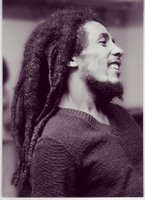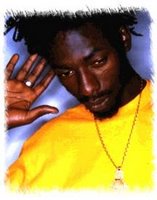The Appropriation of Reggae
Young and old protesters alike readily identify with Bob Marley. They'll quote lyrics from "One Love" as they sway, smoke herb, and talk about peace. When many people think of Bob Marley they think of a man who promoted peace and togetherness and perhaps a little bit of the ol' ganja. Of course, the revolutionary lyrics are entirely ignored. In Talkin' Blues, Marley sings:
"I'm a gonna take a just-a one step more 'cause I feel like bombin' a church. Now that I know that the preacher is lyin'. So who's gonna stay at home when the freedom fighters are fighting?"
I'm not sure that peaceniks can actively promote church bombing unless they want to cro
 ss over into the Anarchist school of protest. Of course, they should probably start listening to Rage Against the Machine or something else if that's the road they're going to follow. In the song Ride Natty Ride Marley sings,
ss over into the Anarchist school of protest. Of course, they should probably start listening to Rage Against the Machine or something else if that's the road they're going to follow. In the song Ride Natty Ride Marley sings,"Tell you what: now the people gather on the beach and the leader try to make a speech, but the Dreadies understandin' that it's too late: fire is burning; man, pull your own weight!"
When the people are on the beach with their leaders it isn't because they want their leaders to enjoy the soft sand, but because they want their leaders to enjoy the warm water . . . and never come back. Bob Marley is often painted as this pot-smoking hippie who played soccer and wanted to live in peace with all humanity. Marley was a great singer and lyricist, but some people lose sight of his revolutionism and tough gangsterism. Marley garnered the nickname "Tuff Gong", not because he was a resilient bronze disc, but because of his fighting skills. He loved the image of the gangster rudeboy and rose to the top utilizing this toughness in combination with his raw talent. Marley was a good man, but he was not the flower-sniffing guru that some paint him as. He was a fighter, a womanizer, a rudeboy, and certainly not a saint.
On Sunday, I heard something on the radio which I found fairly disturbing. On Ottawa's pop-radio station, Hot 89.9, I witnessed the teeth-gnashingly horrific music of Fergie (or Fergilicious as she calls herself . . . she can spell it for you over and over if you want). Fergie, in case you are unaware, is the bikini-clad woman in the bad beer commercial that is the Black Eyed Peas. One of Fergie's hits, the inexplicably stupid "London Bridge" is actually a rip-off of Gwen Stefani's vacuous hit, "Bananas." If you haven't heard of either song, you are blessed indeed. During the course of her interview, Fergie claimed to have been inspired by all types of music. This, presumably, includes a heavy dose of one particular type of music: namely crappy superficial music with no redeeming qualities. She also claimed to "love reggae." Why did I shudder so when I heard this? Is it because the result of pop music which appropriates reggae is often just souless tofu wrapped in a decent chocolate beat?
I find the cultural appropriation of reggae by American pop stars interesting. Certain aspects of the reggae culture are accepted while others are entirely rejected. Red, green, and gold bracelets are readily appropriated by decidedly non-Rastafarian individuals like Gwen Stefani. The red, green, and gold which Rastafarians wear come from Ethiopia's flag. Ethiopia, of course, is the spiritual homeland of Rastafarians who believe that they should lead the repatriation to Ethiopia after the four hundred years of slavery in Babylon (America) are over. For Rastafarians, the red represents the blood of Africans spilt over the years by Babylon, the gold represents the wealth of Africa, and the green represents the beauty and vegetation of Ethiopia. Gwen Stefani, who likely has very little interest in Africa unless it provides the labour force for sweatshops for her fashion line, readily wears the three colours while she wails out her songs over ska, rocksteady, and reggae beats. I am not arguing that non-Rastafarians can't do reggae - they already have proven that they can do it quite well. But when was the last time that Beres Hammond wore the tri-colour around his wrist? Does UB40 ever drape themselves in Rastafarian imagery? Rastafarianism might be bizarre to most of the world, but using their religious symbolism as a fashion accessory is disrespectful.
The troubles of Buju Banton also illustrate this selective cultural appropriation. Fifteen years ago, a teenage Banton recorded a song which has haunted him ever since. The violently anti-homosexual song, "Boom
 Bye Bye", was penned by someone else and voiced by the young Banton. The fact that Jamaican culture has a strong aversion to homosexuality and that Jamaican patois often reflects the violent reality of the street leads to more than a few violently homophobic songs. Beenie Man, Bounty Killer, Capleton, Sizzla, Elephant Man, TOK, Vybz Kartel, and Buju Banton have all been targeted by homosexual advocacy groups for promoting violence against gays. The respective representatives for informers, the pope, rival soundmen, the Queen of England, Osama bin Laden, and the Babylon system are not involved in the movement against these artists despite violent pronouncements against their persons. The day that Fergie or Paris Hilton start talking about killing a batty bwoy is the day that they have truly embraced all the aspects of the music . . . but I am being ludicrous, of course.
Bye Bye", was penned by someone else and voiced by the young Banton. The fact that Jamaican culture has a strong aversion to homosexuality and that Jamaican patois often reflects the violent reality of the street leads to more than a few violently homophobic songs. Beenie Man, Bounty Killer, Capleton, Sizzla, Elephant Man, TOK, Vybz Kartel, and Buju Banton have all been targeted by homosexual advocacy groups for promoting violence against gays. The respective representatives for informers, the pope, rival soundmen, the Queen of England, Osama bin Laden, and the Babylon system are not involved in the movement against these artists despite violent pronouncements against their persons. The day that Fergie or Paris Hilton start talking about killing a batty bwoy is the day that they have truly embraced all the aspects of the music . . . but I am being ludicrous, of course.Admittedly, "Boom Bye Bye" is juvenile, socially irresponsible, and tasteless. However, Banton is caught in a bit of quandary. If he apologizes for the song as his opponents demand he'll be seen as selling out by his people. If he doesn't apologize, gay advocacy groups will continue to picket every single show he has and work hard to ensure that his music does not receive any major radio or television play. Buju Banton has not made any more violently anti-gay songs. In fact, the vast majority of his catalogue over the last decade includes songs that are positive, uplifting, and thoughtful. The remaining tunes are harmless love songs. The supposed goal of the gay advocacy groups is to stop violent music. I would submit that a better way to get through to the reggae community would be through dialogue rather than attacking the music and culture. The attacks against Buju Banton act as a wedge which drive the two sides even further apart.
The point I am trying to make, however, is that while genuinely talented reggae artists like Buju Banton are having th
 eir voices muted, other less talented individuals are cashing in. Recently, the Hasidic singer Matisyahu has gained a lot of attention. Some of his fans are clamouring about the second coming of Bob Marley and other such nonsense. If a Hasidic Jew spitting lyrics in very very poor Jamaican patois is good reggae then the genre is in a lot of trouble. The New Tork Times' Kelefah Sanneh addressed the over-enthusiastic Matisyahu fans this way: "Perhaps Matisyahu's fans aren't familiar with a little-known group of performers who still make great reggae records: Jamaicans." ooch.
eir voices muted, other less talented individuals are cashing in. Recently, the Hasidic singer Matisyahu has gained a lot of attention. Some of his fans are clamouring about the second coming of Bob Marley and other such nonsense. If a Hasidic Jew spitting lyrics in very very poor Jamaican patois is good reggae then the genre is in a lot of trouble. The New Tork Times' Kelefah Sanneh addressed the over-enthusiastic Matisyahu fans this way: "Perhaps Matisyahu's fans aren't familiar with a little-known group of performers who still make great reggae records: Jamaicans." ooch.Matisyahu aside, I believe that non-Jamaicans can and do make great reggae music. Artists such as Alpha Blondie, Seeed, Tryo, Lucky Dube, Gentleman, UB40, and Tyken Jah Fakoly all make wonderful reggae music. Reggae has reached around the world from Latin America to Africa to Europe and even Japan. The problem is when the form of reggae is adopted without the soul or when the masters are ignored in favour of the imposters.

3 comments:
I can't take this seriously, since you forgot to mention Snow in your list of great non-Jamaican reggae artists...tsk tsk
i'm with piet on this one.
SHAME!!!!!!!!!!!!
Informah! you no say daddy me Snow me I'll go blame
A licky boom boom down.
Whoop, my bad.
Post a Comment